Norne: Real field black-oil model
Blackoil Validation InputFileThe Norne model is a real field model. The model has been adapted so that the input file only contains features present in JutulDarcy, with the most notable omissions being removal of hysteresis and threshold pressures between equilibriation reqgions. For more details, see the OPM data webpage
julia
using Jutul, JutulDarcy, GLMakie, DelimitedFiles, HYPRE, GeoEnergyIO
norne_dir = GeoEnergyIO.test_input_file_path("NORNE_NOHYST")
data_pth = joinpath(norne_dir, "NORNE_NOHYST.DATA")
data = parse_data_file(data_pth)
case = setup_case_from_data_file(data); Downloading artifact: NORNE_NOHYST
F-4H completion: Removed COMPDAT as (36, 68, 17) is not active in processed mesh.
Rel. Perm. Scaling: Three-point scaling active.
Shutting D-1H: Well has no open perforations at step 137, shutting.
Initialization: Negative saturation in 215 cells for phase 2. Normalizing.
Transmissibility: Replaced 2 non-finite half-transmissibilities (out of 268308, 0.0%) with zero.
Transmissibility: Replaced 2 non-finite half-transmissibilities (out of 268308, 0.0%) with zero.Unpack the case to see basic data structures
julia
model = case.model
parameters = case.parameters
forces = case.forces
dt = case.dt;Plot the reservoir mesh, wells and faults
We compose a few different plotting calls together to make a plot that shows the outline of the mesh, the fault structures and the well trajectories.
julia
import Jutul: plot_mesh_edges!
reservoir = reservoir_domain(model)
mesh = physical_representation(reservoir)
wells = get_model_wells(model)
fig = Figure(size = (1200, 800))
ax = Axis3(fig[1, 1], zreversed = true)
plot_mesh_edges!(ax, mesh, alpha = 0.5)
for (k, w) in wells
plot_well!(ax, mesh, w)
end
plot_faults!(ax, mesh, alpha = 0.5)
ax.azimuth[] = -3.0
ax.elevation[] = 0.5
fig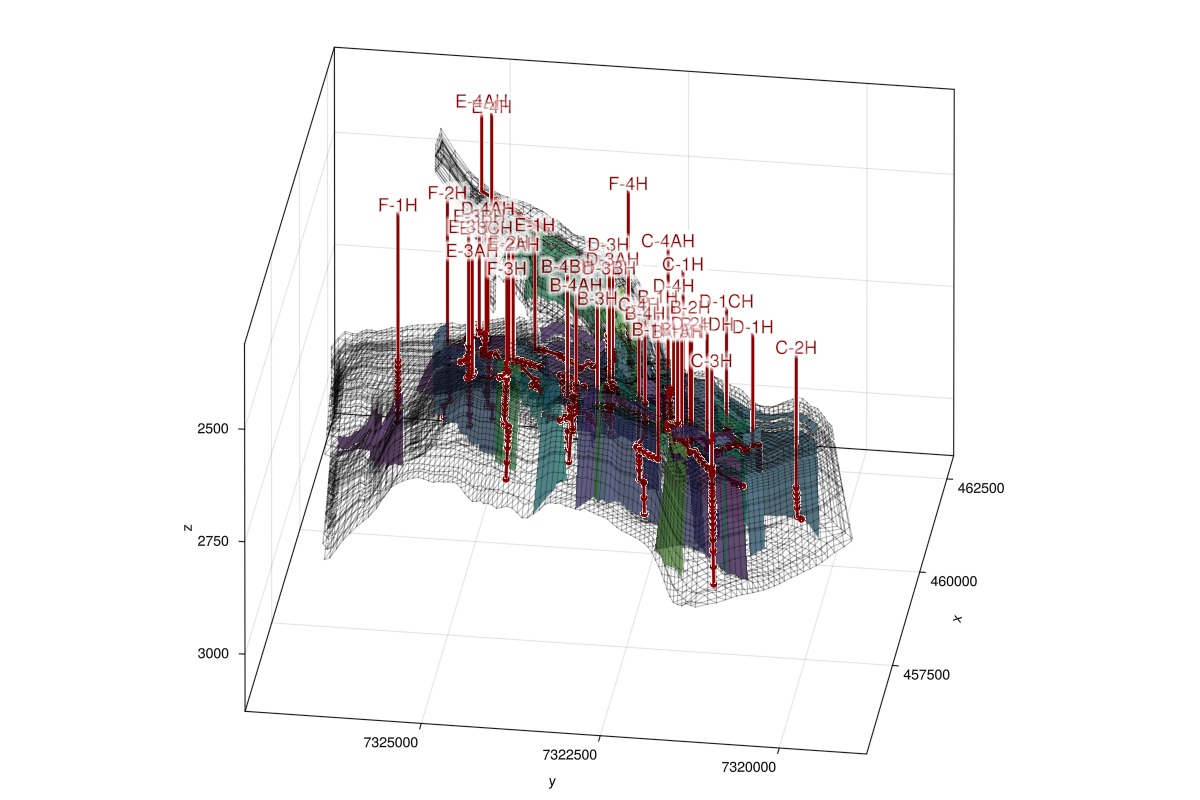
Plot the reservoir static properties in interactive viewer
julia
fig = plot_reservoir(model, key = :porosity)
ax = fig.current_axis[]
plot_faults!(ax, mesh, alpha = 0.5)
ax.azimuth[] = -3.0
ax.elevation[] = 0.5
fig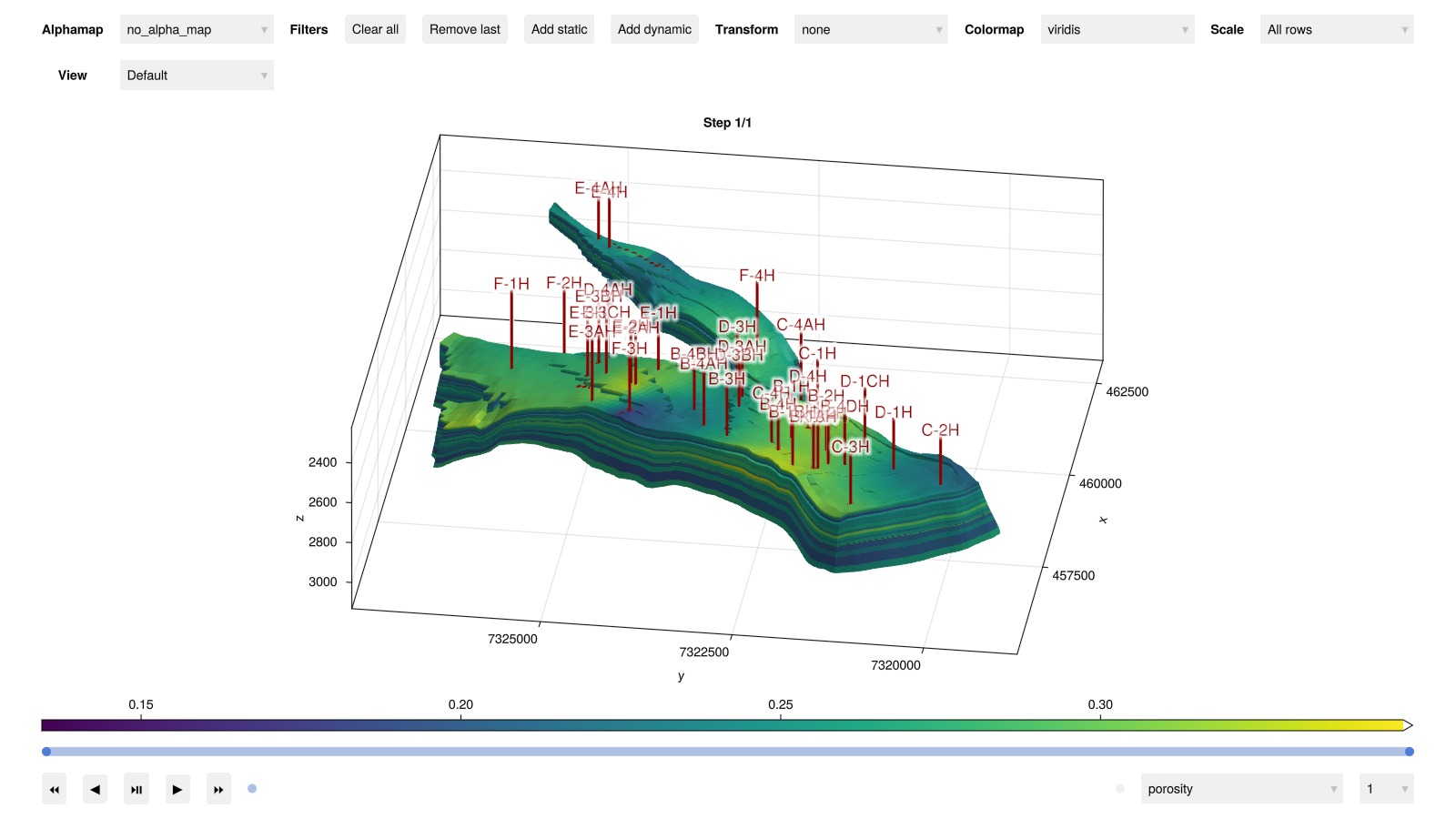
Simulate the model
julia
ws, states = simulate_reservoir(case, output_substates = true)ReservoirSimResult with 476 entries:
wells (36 present):
:D-2H
:F-2H
:D-4H
:B-1H
:C-4H
:F-1H
:B-4AH
:C-1H
:B-2H
:E-1H
:B-4BH
:D-3AH
:D-3BH
:C-3H
:E-3H
:K-3H
:E-4AH
:D-1H
:B-1AH
:E-3CH
:E-4H
:E-2H
:E-2AH
:C-4AH
:B-1BH
:C-2H
:B-4DH
:D-3H
:E-3AH
:D-4AH
:B-3H
:F-3H
:E-3BH
:D-1CH
:F-4H
:B-4H
Results per well:
:wrat => Vector{Float64} of size (476,)
:Aqueous_mass_rate => Vector{Float64} of size (476,)
:orat => Vector{Float64} of size (476,)
:bhp => Vector{Float64} of size (476,)
:mrat => Vector{Float64} of size (476,)
:gor => Vector{Float64} of size (476,)
:lrat => Vector{Float64} of size (476,)
:mass_rate => Vector{Float64} of size (476,)
:rate => Vector{Float64} of size (476,)
:Vapor_mass_rate => Vector{Float64} of size (476,)
:control => Vector{Symbol} of size (476,)
:Liquid_mass_rate => Vector{Float64} of size (476,)
:wcut => Vector{Float64} of size (476,)
:grat => Vector{Float64} of size (476,)
states (Vector with 476 entries, reservoir variables for each state)
:Pressure => Vector{Float64} of size (44417,)
:ImmiscibleSaturation => Vector{Float64} of size (44417,)
:BlackOilUnknown => Vector{BlackOilX{Float64}} of size (44417,)
:TotalMasses => Matrix{Float64} of size (3, 44417)
:Rs => Vector{Float64} of size (44417,)
:Rv => Vector{Float64} of size (44417,)
:Saturations => Matrix{Float64} of size (3, 44417)
time (report time for each state)
Vector{Float64} of length 476
result (extended states, reports)
SimResult with 247 entries
extra
Dict{Any, Any} with keys :simulator, :config
Completed at Mar. 02 2026 22:46 after 6 minutes, 49 seconds, 184.6 milliseconds.Plot the reservoir solution
julia
fig = plot_reservoir(model, states, step = 247, key = :Saturations)
ax = fig.current_axis[]
ax.azimuth[] = -3.0
ax.elevation[] = 0.5
fig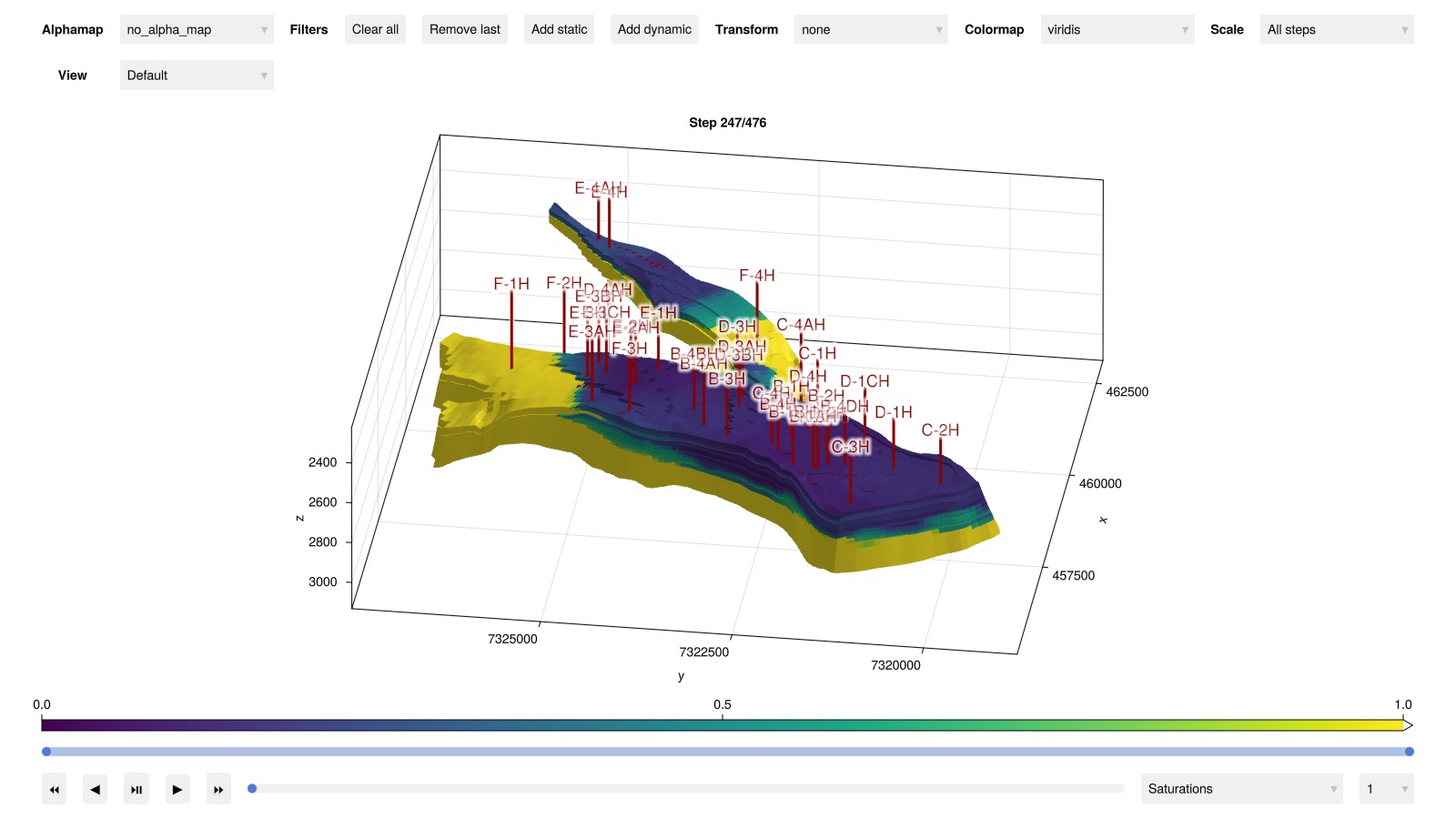
Load reference and set up plotting
julia
csv_path = joinpath(norne_dir, "REFERENCE.CSV")
data_ref, header = readdlm(csv_path, ',', header = true)
time_ref = data_ref[:, 1]
time_jutul = deepcopy(ws.time)
wells = deepcopy(ws.wells)
wnames = collect(keys(wells))
nw = length(wnames)
day = si_unit(:day)
cmap = :tableau_hue_circle
inj = Symbol[]
prod = Symbol[]
for (wellname, well) in pairs(wells)
qts = well[:wrat] + well[:orat] + well[:grat]
if sum(qts) > 0
push!(inj, wellname)
else
push!(prod, wellname)
end
end
function plot_well_comparison(response, well_names, reponse_name = "$response"; cumulative = false)
fig = Figure(size = (1000, 400))
if response == :bhp
ys = 1/si_unit(:bar)
yl = "Bottom hole pressure / Bar"
elseif response == :wrat
ys = si_unit(:day)
if cumulative
yl = "Cumulative water rate / m³"
else
yl = "Water rate / m³/day"
end
elseif response == :grat
ys = si_unit(:day)/1e6
if cumulative
yl = "Cumulative gas rate / 10⁶ m³"
else
yl = "Gas rate / 10⁶ m³/day"
end
elseif response == :orat
ys = si_unit(:day)/(1000*si_unit(:stb))
if cumulative
yl = "Cumulative oil rate / 10³ stb"
else
yl = "Oil rate / 10³ stb/day"
end
else
error("$response not ready.")
end
welltypes = []
ax = Axis(fig[1:4, 1], xlabel = "Time / days", ylabel = yl)
i = 1
linehandles = []
linelabels = []
for well_name in well_names
well = wells[well_name]
label_in_csv = "$well_name:$response"
ref_pos = findfirst(x -> x == label_in_csv, vec(header))
qoi = copy(well[response]).*ys
qoi_ref = data_ref[:, ref_pos].*ys
tot_rate = copy(well[:rate])
grat_ref = data_ref[:, findfirst(x -> x == "$well_name:grat", vec(header))]
orat_ref = data_ref[:, findfirst(x -> x == "$well_name:orat", vec(header))]
wrat_ref = data_ref[:, findfirst(x -> x == "$well_name:wrat", vec(header))]
tot_rate_ref = grat_ref + orat_ref + wrat_ref
if cumulative
@. qoi_ref[tot_rate_ref == 0] = 0
@. qoi[tot_rate == 0] = 0
qoi_ref = cumsum(qoi_ref.*diff([0, time_ref...]./day))
qoi = cumsum(qoi.*diff([0, time_jutul...]./day))
else
@. qoi_ref[tot_rate_ref == 0] = NaN
@. qoi[tot_rate == 0] = NaN
end
crange = (1, max(length(well_names), 2))
lh = lines!(ax, time_jutul./day, abs.(qoi),
color = i,
colorrange = crange,
label = "$well_name", colormap = cmap
)
push!(linehandles, lh)
push!(linelabels, "$well_name")
lines!(ax, time_ref./day, abs.(qoi_ref),
color = i,
colorrange = crange,
linestyle = :dash,
colormap = cmap
)
i += 1
end
l1 = LineElement(color = :black, linestyle = nothing)
l2 = LineElement(color = :black, linestyle = :dash)
Legend(fig[1:3, 2], linehandles, linelabels, nbanks = 3)
Legend(fig[4, 2], [l1, l2], ["JutulDarcy.jl", "OPM Flow"])
fig
endplot_well_comparison (generic function with 2 methods)Injector bhp
julia
plot_well_comparison(:bhp, inj, "Bottom hole pressure")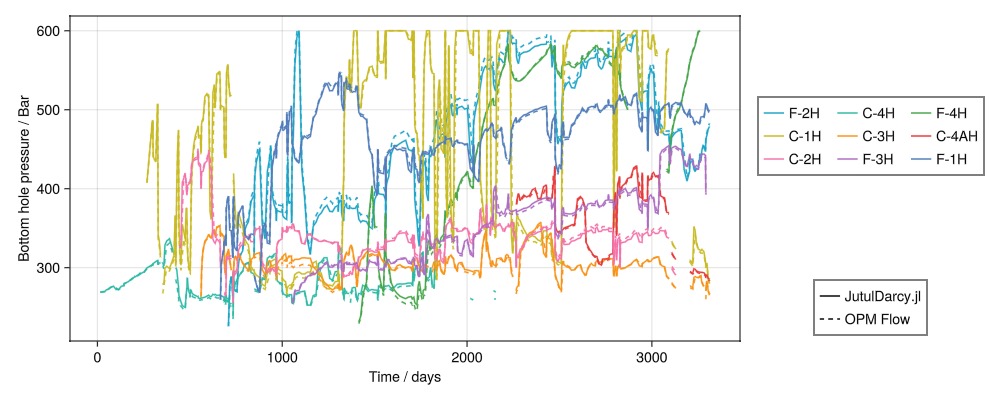
Gas injection rates
Rates
julia
plot_well_comparison(:grat, inj, "Gas surface injection rate")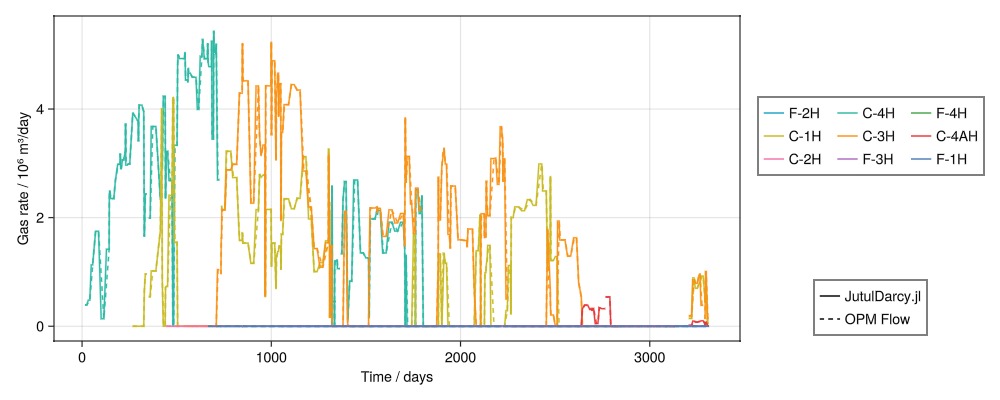
Cumulative gas injection rates
julia
plot_well_comparison(:grat, inj, "Cumulative gas surface injection rate", cumulative = true)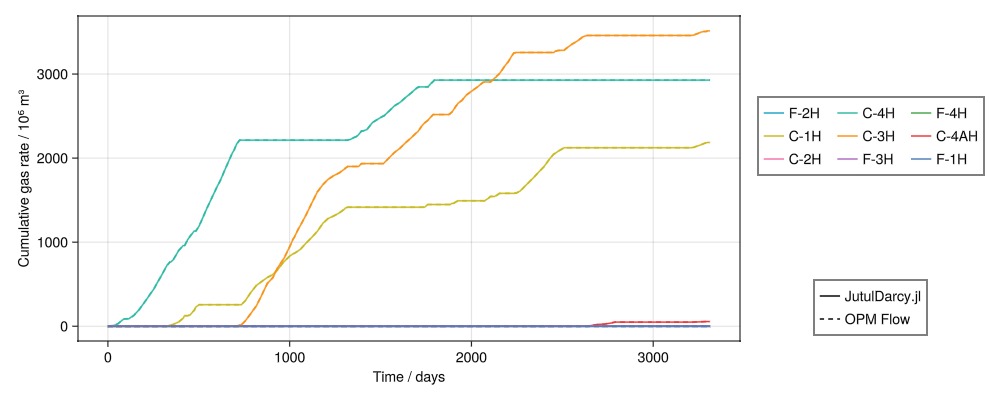
Water injection rates
Rates
julia
plot_well_comparison(:wrat, inj, "Water surface injection rate")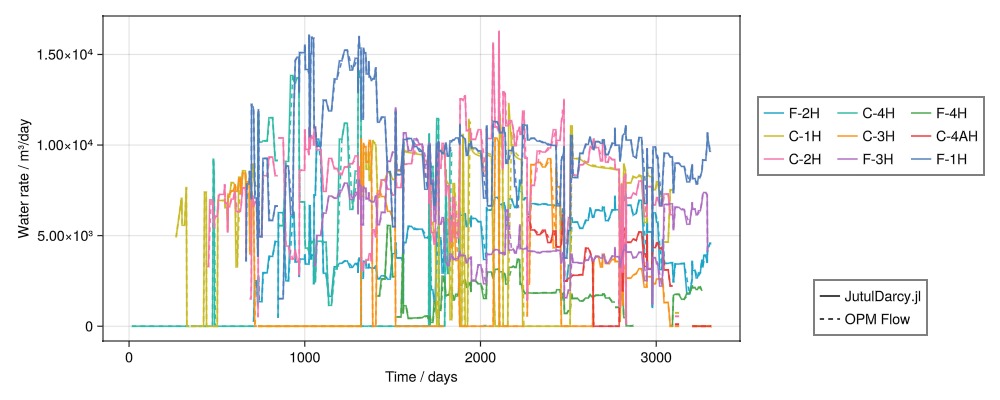
Cumulative rates
julia
plot_well_comparison(:wrat, inj, "Cumulative water surface injection rate", cumulative = true)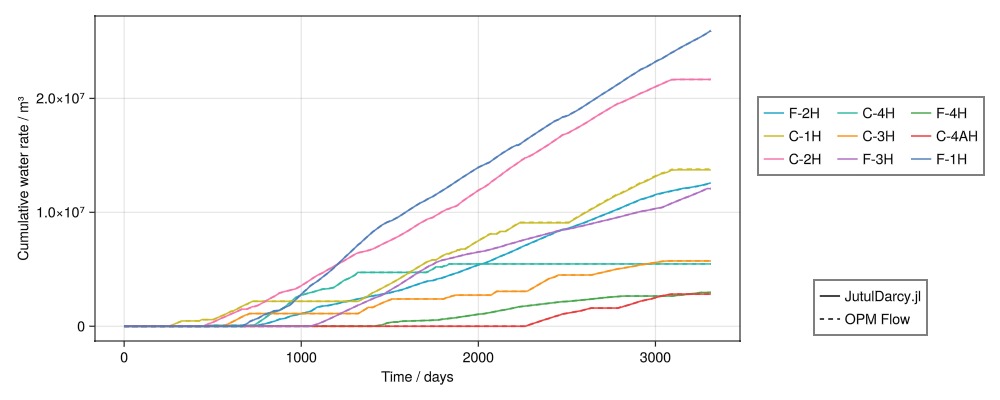
Producer bhp
julia
plot_well_comparison(:bhp, prod, "Bottom hole pressure")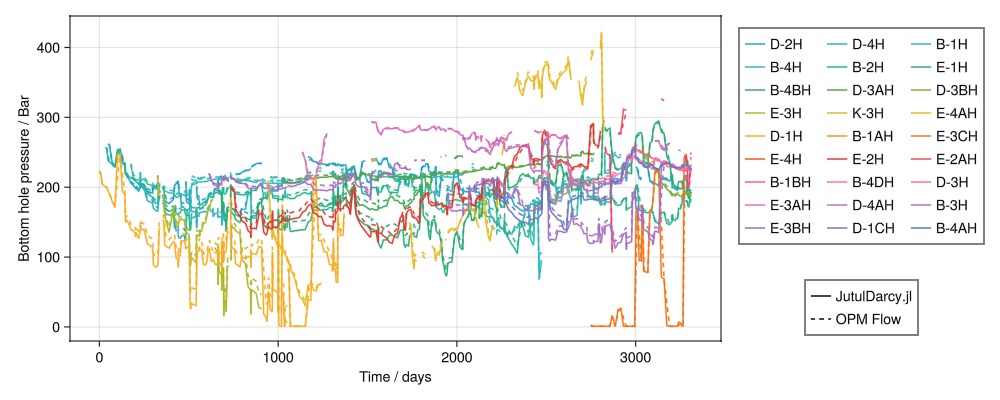
Oil production rates
Rates
julia
plot_well_comparison(:orat, prod, "Oil surface production rate")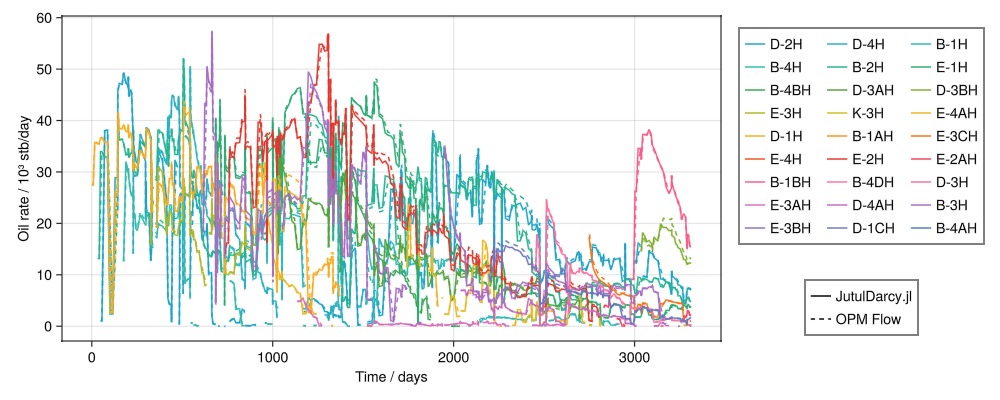
Cumulative rates
julia
plot_well_comparison(:orat, prod, "Cumulative oil surface production rate", cumulative = true)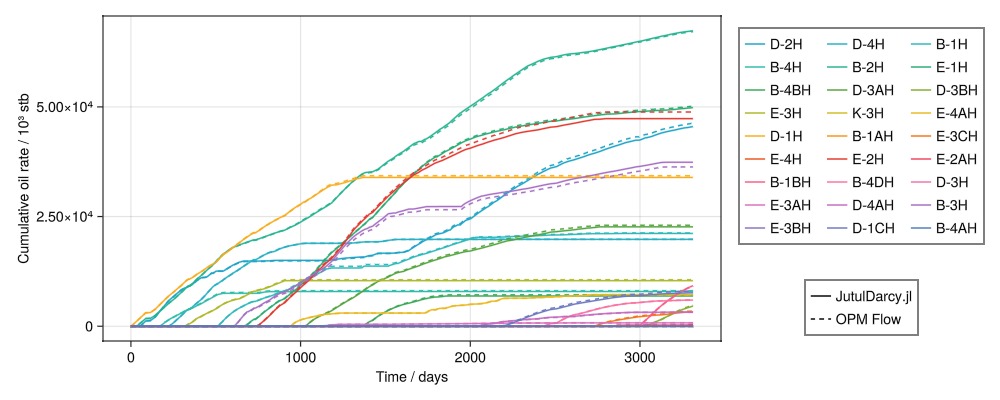
Gas production rates
Rates
julia
plot_well_comparison(:grat, prod, "Gas surface production rate")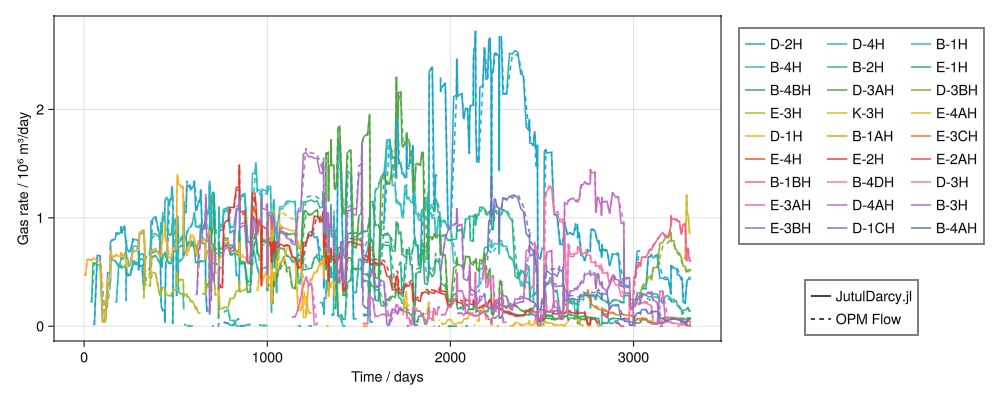
Cumulative rates
julia
plot_well_comparison(:grat, prod, "Cumulative gas surface production rate", cumulative = true)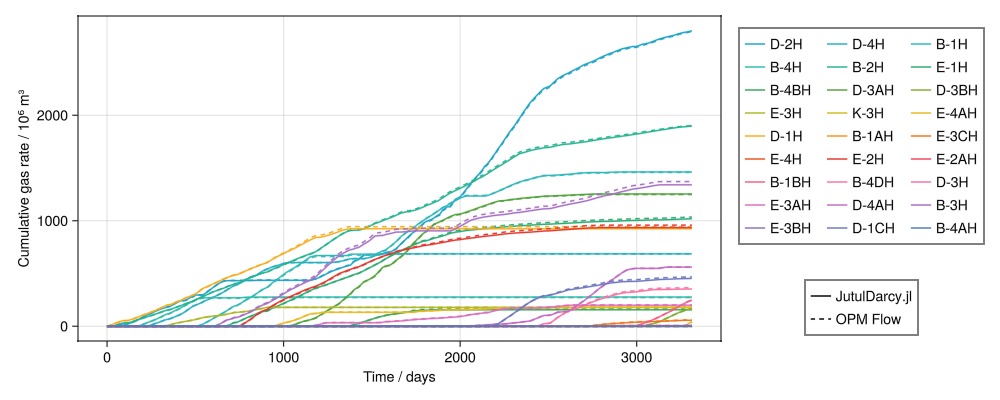
Water production rates
Rates
julia
plot_well_comparison(:wrat, prod, "Water surface production rate")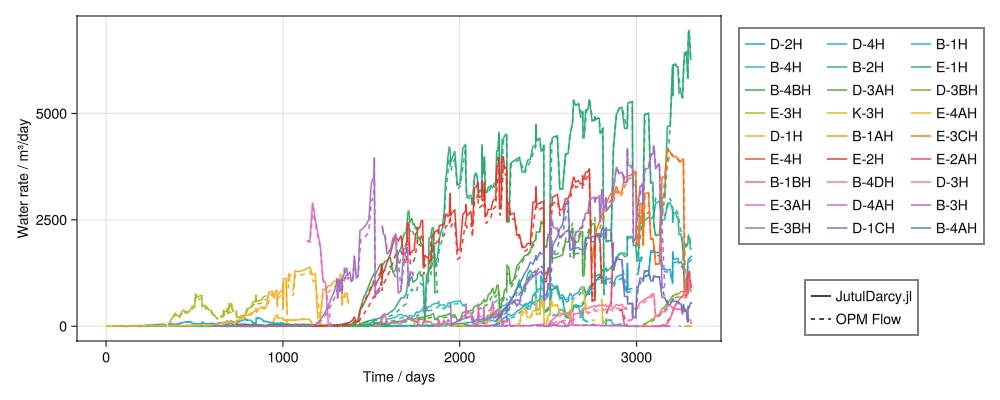
Cumulative rates
julia
plot_well_comparison(:wrat, prod, "Cumulative water surface production rate", cumulative = true)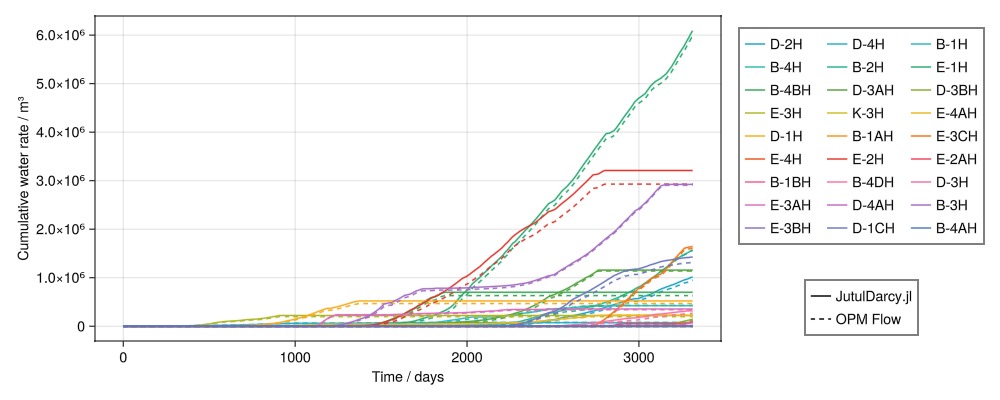
Interactive plotting of field statistics
julia
plot_reservoir_measurables(case, ws, states, left = :fgpr, right = :pres)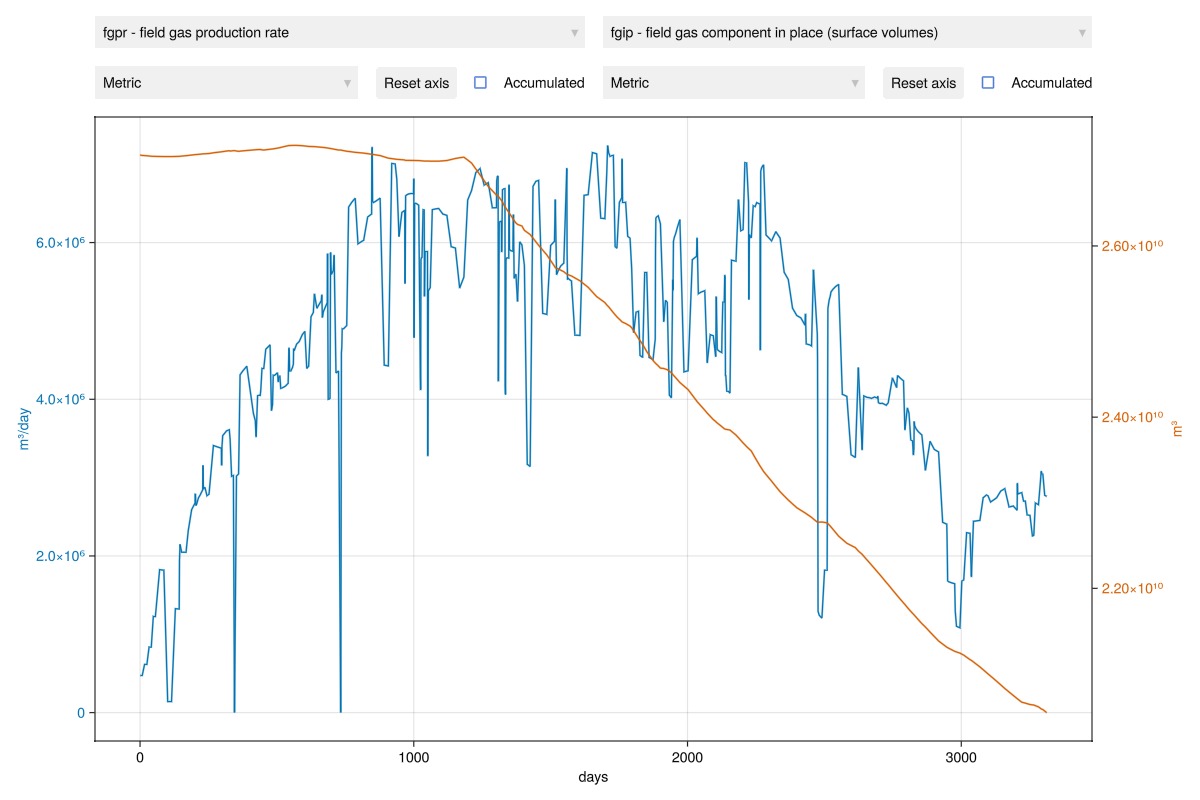
Plot wells
julia
plot_well_results(ws)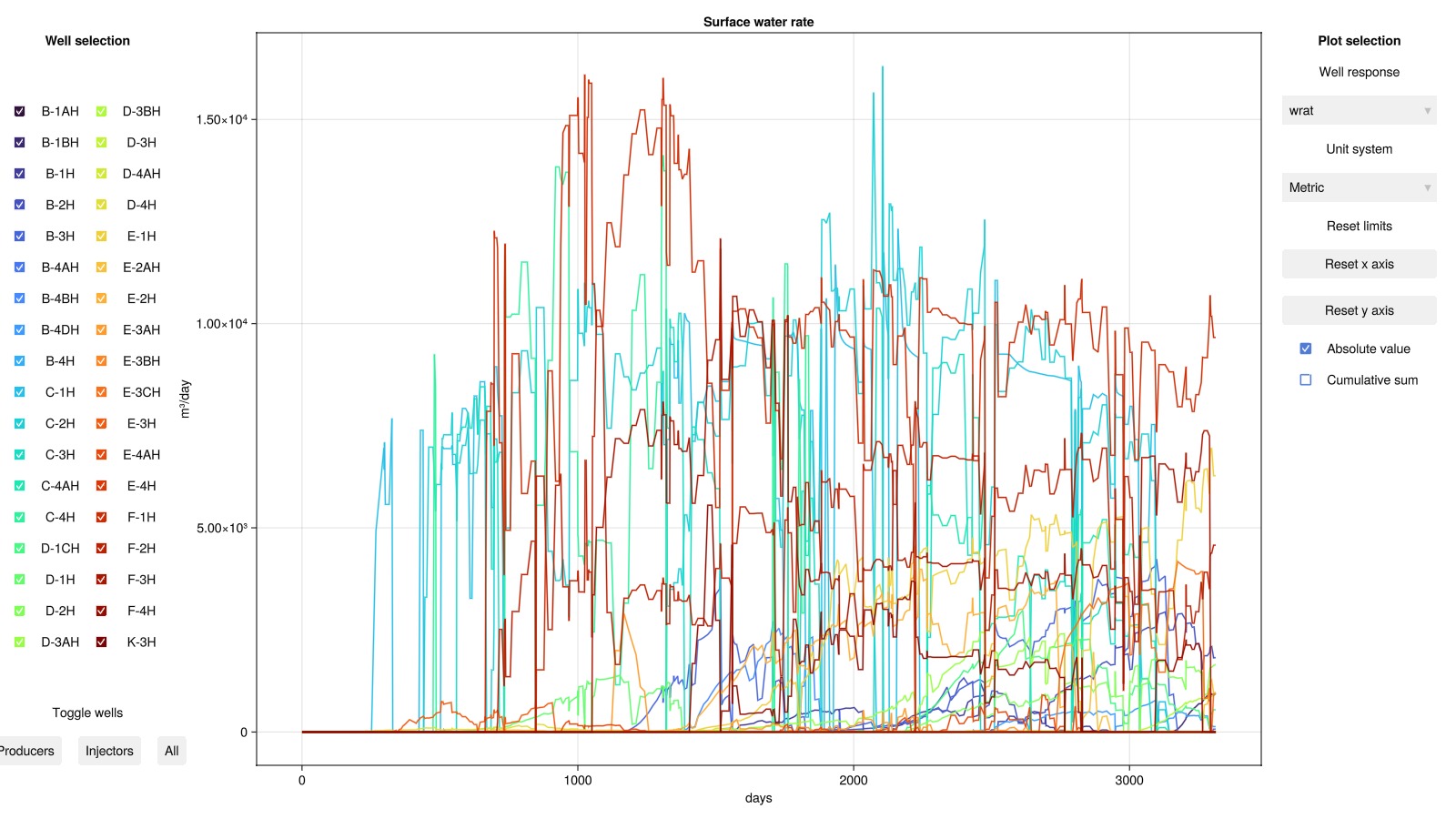
Example on GitHub
If you would like to run this example yourself, it can be downloaded from the JutulDarcy.jl GitHub repository as a script, or as a Jupyter Notebook
This example took 549.242446262 seconds to complete.This page was generated using Literate.jl.